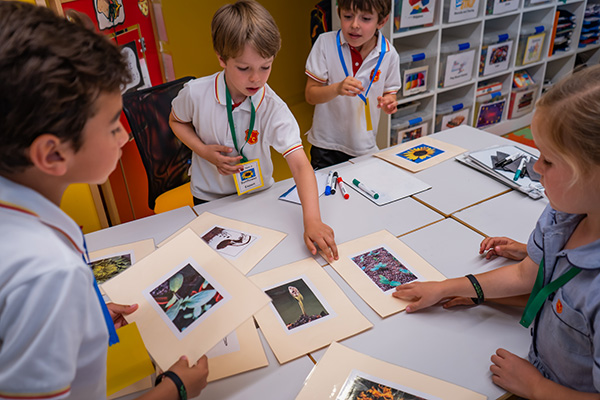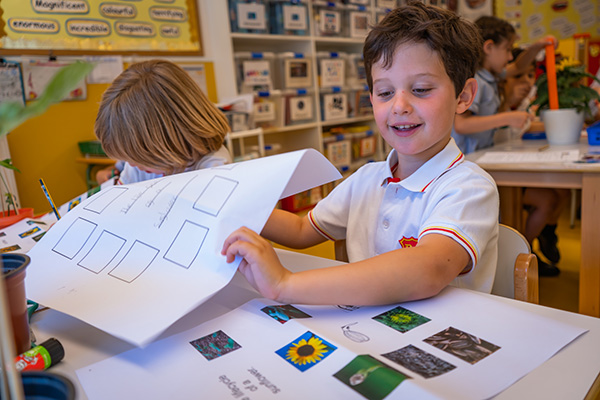ACADEMIC
Key Stage 1
Our philosophy in Key Stage 1 is to help the children to develop as confident, enthusiastic learners, by providing them with a curriculum which is engaging, broad and rich.
To get the most out of learning, the children need to work on four basic skills: speaking, listening, reading and writing. Through Literacy, we provide them with the opportunity to express themselves clearly and creatively. They listen to and read stories, non fiction and poetry from a range of different cultures, explore their imagination and learn to read to discover facts. Children are also taught phonics daily (following the Read, Write Inc phonics programme), to build their knowledge of letter sounds so they are able to decode, read and spell words.
We, as adults, use Maths as part of our everyday lives, whether shopping, travelling or working. We endeavour to set our mathematical activities wherever possible in a practical context, related to the real world they will later encounter. Learning to calculate with money, for example, becomes much more real through role play in the class shop.

All children have a natural curiosity about the way the world works. Through Science activities we can teach them how to get the answers to questions such as how plants grow or why it is dark at night. Any opportunities to make Science practical are taken; highlights of the year being visits to the local Science museum and in both in Term 1 and Term 3 to an Outdoor Educational Centre, where the children have first hand experience of caring for plants and animals.
Modern technology is changing the way we live and work. In our Computing classes we give the children the opportunity to learn how to manage this technology. They are taught the importance of the internet in our everyday lives, with a particular focus on how to stay safe while using it. KS1 children have experience of using iPads to further their learning and are introduced to algorithms and basic programming by using Beebots.
History introduces the children to an unfamiliar but important world, that of the past. We enable the children to use different kinds of evidence to find out about people’s lives and events and how things have changed. This may range from exploring the recent past by encouraging them to talk or write to grandparents to find out about how schools have changed in the last century, to making their own versions of Tutankhamen’s mask to bring Ancient History to life.
Learning about the links between our lives and the local environment is central to Geography at KS1. Being a British International School, we also take the opportunity to celebrate the diversity of cultures we have at Runnymede whenever possible.
Making music together helps the children explore and express their thoughts and feelings. We also use it as an opportunity for them to develop self-confidence through performing for the School and their parents. This may simply take the form of leading the other classes in a song during assembly or on a larger scale performing a Year group assembly or a Key Stage production. These involve not only singing, but also acting, poetry and dance.
Another means of developing the children’s self-confidence, enabling them to thus lead happy, independent lives, is through Circle Time. Our weekly ‘Jigsaw’ lessons give them the opportunity to learn to respect one another and develop a sense of right and wrong, fair and unfair and how to value and celebrate how each of them is unique.
Through P.E. we want the children to learn that it is fun to stay in shape, something which is fundamental if they are to lead active and healthy lives as they grow up. We also give them the opportunity to experience healthy competition through two different sports events during the year. Term 1 takes the form of a Flat Race event, testing their speed, whilst in Term 3 the children take part in our Summer Sports morning, where a range of different events test their skill, agility and ability to work as a team. In each of these events the children’s efforts count towards points for their respective Houses (Austen, Keynes, Locke and Newton) and a cup is awarded to the winning House. We hope they not only take pride in their own achievements but also learn to celebrate those of others.
Thus, our curriculum is based on experience and activity, with a balance between class teaching, group activities and individual support. We plan each day with this balance in mind in order to maximise opportunities for the children’s development throughout their time spent in Year 1 and 2. As well as a broad curriculum, we believe in the importance of creating a stimulating classroom environment, where displaying the children’s work is a way of reinforcing the message that we value and care about their efforts. We have high, but not unrealistic expectations of the children. They are observed and assessed through a mixture of formative and summative assessments each term, to discover their needs and capabilities throughout Year 1 and 2. However, any assessment is carried out in such a way that it is stress free for the children and produces a true reflection of their capabilities, with the testing forming a natural part of the classroom activities.

Within Key Stage 1, we feel strongly that we should not be working in isolation to educate the children in our classes. Parents are the first and most enduring teachers and play a crucial role in helping the children learn.
We encourage a partnership between home and school. We hold Year group meetings at the start of the year to explain our expectations and termly individual meetings with all parents to discuss the progress and next steps for their child.
We also strongly encourage parents to be actively involved at home through activities such as reading together with their child or monitoring homework. This thus ensures the children are able to reach their full potential in the time they spend in Year 1 and 2.
As the children complete Key Stage 1, we hope they will have developed confidence, positive motivation and security in their abilities. We hope they feel they have talent and potential. We hope they have been engaged in learning that develops and excites their imagination. Above all, we hope they will have learnt to love learning!


